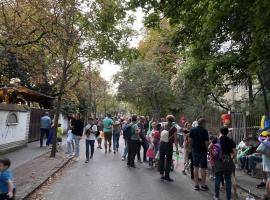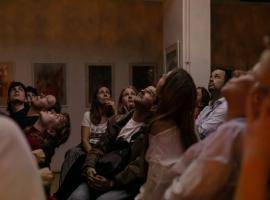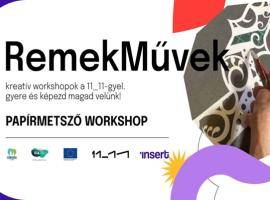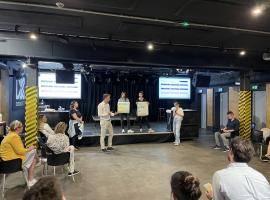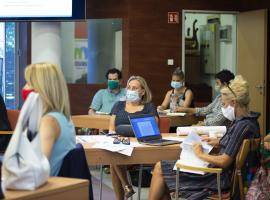Planning a new cultural venue, Part 2: Connecting to Újbuda’s existing institutional tissue

A new cultural institution never arrives in a vacuum. When conceiving new venues, cultural planners often ignore existing organisations and interfere with their modus operandi, lure away their public and disrupt their funding. This is a particularly acute issue in Hungary where the 2010 European Capital of Culture season of Pécs and its costly new cultural venues led to the disappearance of various established cultural organisations. The controversial process of the near bankruptcy of the Pécs municipality and the city’s entire cultural scene prompted extensive self-reflection. It also gave birth to initiatives like the Local Operators‘ Platform, connecting local cultural operators across Europe in a quest to counter the dominance of large events and institutions in cultural development strategies.
As LOCOP’s experience shows, the experience of Pécs is far from unique. With a stronger emphasis on the role of community involvement and the long-term development of local cultural scenes as opposed to top-down management strategies of flagship cultural events and large-scale cultural infrastructure development projects, a new cultural development paradigm is born. This new cultural development paradigm is less about costly new venues than about new elements in local cultural ecosystems that add to the strength and resilience of already existing cultural actors and institutions and potentially connects them to other sectors as well. According to this logic, when conceiving a new institution in an area with a rich local cultural and economic ecosystem, or eventually, like in the case of Újbuda, a set of well-developed cultural institutions, it is important to find the place for this new institution within the existing tissue.
The planning of Adaptér is overseen by KözPont Kft., the municipality’s public company responsible for cultural institutions. KözPont was created in 2015, following a change in national legislation that forced municipal cultural institutions into a company form. Központ now oversees a great diversity of cultural venues, including four community houses, a local history archive, a library and a variety of cultural centres.

I met Nikolett Antal, director of KözPont, and Alexandra Petrik, project manager of “offline spaces” in CUP4Creativity, on the terrace of Tranzit Café, one of the first beneficiaries of the municipality’s Cultural Quarter programme, offering cultural initiatives and organisations subsidised rental contracts in municipality-owned properties. Tranzit was established in the late 2000s and has been open as a restaurant, gallery and event venue ever since, stretching the boundaries of the Cultural Quarter towards the South.
“Sometimes it feels as if I were a translation software,” Nikolett explains her position within the administrative machinery, “who tries to mediate between my colleagues and the city leadership, translating information so that everyone is on the same page.” While it is important to maintain strong, consistent relations with the political leadership, it is as critical to keep a daily contact with KözPont’s employees in the various cultural institutions and venues across the district.
KözPont’s network of institutions consists of a mix of progressive cultural centres and community venues. Connecting contemporary art exhibitions or literature events with artisan workshops or folk dance groups into a coherent framework is far from being an obvious task, let alone supporting these events with human resources. “It is very difficult to find people who have an overview of both contemporary culture and public education – and in the same time know what their personal boundaries are and when they need to ask for support,” admits Nikolett.
Since KözPont’s key mission is to support “culture, communication, media, education, city marketing, tourism, participation, talent management and social integration” in the district, the institutions and venues administered by the company also have a diversity of profiles: many of them have as much of a community or welfare dimension as a cultural purpose. Dealing with community centres, for instance, is more complex than with professional art institutions: “It’s important to put on the table what a community house is all about,” underlines Nikolett. “To what extent it performs cultural tasks and to what extent it performs cultural, social, welfare tasks in the sense that it brings people into a non-professional community.”
Despite this diversity of profiles, approaches and missions, meaningful cooperation between different institutions and venues of the district is a key priority for KözPont. This cooperation is implemented by KözPont’s employees who all know how to relate to the different spaces. At the infrastructural level, the two technical managers of the company respond to all the technical issues emerging in the various cultural venues. Besides sharing human resources through technicians and caretakers who move between venues when their work is needed somewhere, the venues also have access to a shared pool of equipment: “The idea is that if some tools or devices are missing at one location, you don’t need to rent them but you can borrow them from another institution.”
At the level of content, cooperation among the venues is even more nuanced: “There are regular meetings between our cultural organizers,” emphasises Nikolett. “We always share information between the community houses and the other institutions, and we even frequent each other's programs so that everyone can see what's going on in the other institutions and help each other."

This is the network of institutions where Adaptér will have to find its place. While the main structure of the future venue had already established, it was important to “bring the vision down to the ground of reality and start clarifying, specifying what is really needed there,” explains Alexandra. While the consortium partners and experts beyond the partnership can channel their knowledge into Adaptér’s idea, research conducted during the project also helps fine-tuning the concept. While the cultural mapping conducted by the KÉK–Hungarian Contemporary Architecture Centre and the ecosystem workshops led by Rita Szerencsés confirmed many things that the area’s cultural workers knew about the district, there were many new aspects, notably the need by young families to spend quality time with their children regardless the weather, that were new to KözPont.
Another key return of the work with project partners is a better understanding of the missing links in Újbuda’s cultural and business ecosystem. “Strangely enough, apart from KÉK, no one has been able to deal with the proximity of the Technical University and its students so far,” admits Alexandra. “In reality, there could be a lot of connections between the district’s cultural milieu and the university.” As a result of this recognition, the concept of Adaptér and its technical facilities directly build on the proximity of the Technical University and aim to engage special colleges and self-education circles. “Talking to students revealed a lot about what their needs might be that we could serve in a unified way,” recalls Alexandra, “and Adaptér has been conceived with these inputs in mind.”
Similarly, discussions with artist ateliers and design workshops in Újbuda helped clarify needs that the new centre could respond to. “It’s not certain that the workshops had an explicit need for a network, but as we started talking to them, it turned out that they didn’t even know what the other ateliers were doing,” clarifies Alexandra. “For example, if someone needs to do carpentry work, they don’t know where to go. Until now, artists did not think that this can be solved locally.”
Carpentry work and artists is one of the many potential connections that the new venue and the related digital platform can create. Identifying and clustering such latent needs and pooling resources and facilities locally to respond to them is one of the key promises of CUP4Creativity: “If we can implement projects in Adaptér, if organizations in the area bring their workshops and production activities here, it will also create collaborations. If various ateliers cannot accommodate each other, Adaptér can be a third place where they can meet.”

Yet the ambitions of Adaptér go beyond just connecting actors of the cultural sector: if CUP4Creativity wants to create a new role for culture within the broader local economy, it also needs to reach out beyond the limits of the local cultural scene. Besides addressing local cultural initiatives and helping the work of local producers, therefore, the new venue is also conceived to develop strong relationships with technology companies and larger corporations in the district, by offering space and knowledge for workshops, training events and cultural services for employees. This aspiration points towards creating a bridge between sectors that have been co-existing in the district without any connection or exchange.
Working towards these objectives, besides building on KözPont’s local network of cultural initiatives, organisations and venues, Adaptér can also rely on its innovative institutional model. The organisation’s sensible approach to the new venue’s context, demography and communication is a sort of a guarantee to create a new venue embedded in its social and cultural reality. With additional pressure by the limitations of municipal budgets, Adaptér will also be forced to continuously adapt to the needs of its users and customers, thus making the new venue all the more rooted in its broader economic context

